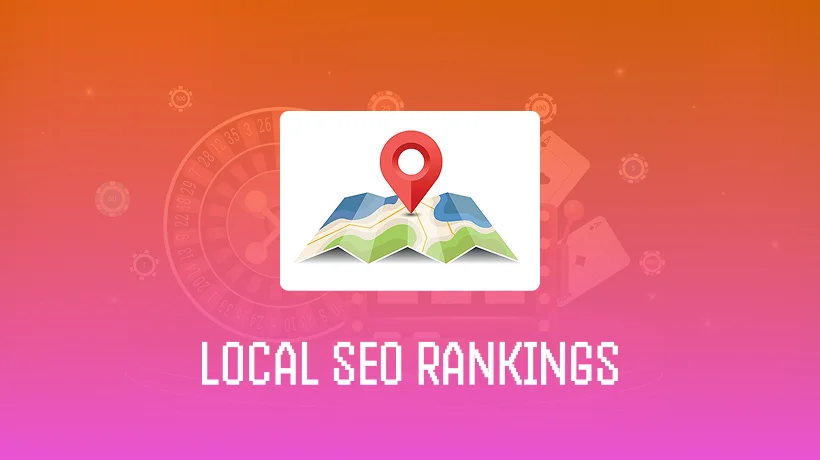Why Local SEO Works Differently for iGaming
But if you’re running an online casino or sportsbook, “local SEO” doesn’t mean what you think it means.
Traditional local SEO targets “near me” searches. Coffee shops, dentists, plumbers—they all want to show up when someone searches nearby. That’s not your game.
For iGaming operators, local SEO means ranking in specific geographic markets where you’re actually licensed to operate. It’s about jurisdictions, not neighborhoods. Can you legally serve players in New Jersey? Then you need to rank there. Operating in the UK? Different strategy entirely.
This matters because the global iGaming market hit $107.6 billion in 2025, and more than half that traffic comes from search engines. Miss the SEO piece, and you’re leaving serious money on the table.
The catch? You can’t just copy what works for other industries.
Different countries, even different states within the US, have wildly different gambling laws. What’s legal in Michigan is prohibited in Texas. Your UK content can’t look identical to your German content, and forget about using Google Business Profile the way a physical store would.
This guide breaks down the ranking factors that actually move the needle for iGaming. You’ll learn what works for online operators versus brick-and-mortar casinos, how to handle geo-restrictions without getting penalized, and which tactics deliver the best ROI. (Spoiler: local SEO converts 8.5x better than cold calling.)
Let’s start with what actually makes Google rank gambling sites.
Core Local Ranking Factors That Actually Work
Location-Specific Content
This is where most operators get it wrong. They translate their English homepage into German and call it “localization.” That’s not enough.
Google needs to see genuinely different content for each market you serve. Start with your URL structure. Use subdirectories like yoursite.com/uk/ for the UK market and yoursite.com/nj/ for New Jersey. This approach shares domain authority across all your markets while keeping content separated.
What makes content truly local? More than just language.
Each location page needs local payment methods (Interac for Canada, Sofort for Germany). Display prices in local currency. Reference local sports teams—”bet on the Eagles” works in Philadelphia, not London. Show your gambling license for that specific jurisdiction prominently.
| Content Element | UK Market | US (New Jersey) | Brazil |
|---|---|---|---|
| Payment Methods | PayPal, Skrill, Neteller | PayPal, Visa, Play+ | Pix, Boleto, Local Cards |
| Sports Focus | Premier League, Cricket | NFL, NBA, MLB | Futebol, MMA |
| Terminology | “Betting shops”, “Bookmakers” | “Sportsbook”, “Casino” | “Apostas”, “Cassino” |
| License Display | UK Gambling Commission | NJ Division of Gaming | Ministry of Finance |
Your keywords need geographic modifiers too. Target “online casino New Jersey” instead of generic “online casino.” The competition is lower, and the intent is clearer.
One technical note: Use hreflang tags. These tell Google which page version serves which country. Think of them as traffic directors—they prevent duplicate content issues when you have similar content in multiple markets.
Mobile Optimization
60% of iGaming revenue comes from mobile devices. Read that again. More than half your money comes from phones.
Speed kills conversions. 53% of users abandon sites that take longer than three seconds to load.
Test your site right now with Google PageSpeed Insights. If you’re scoring below 50 on mobile, you’re losing money. Fix it before doing anything else.
What slows sites down? Usually images. Compress them. Use WebP format instead of JPG or PNG. Enable lazy loading so images only load when users scroll to them. Use a Content Delivery Network (CDN) to serve content from servers closer to your users.
Mobile optimization matters more in iGaming than almost any other industry. Players bet during commercials, on their commute, while watching games live. If your site lags, they’re gone.
Trust Signals and E-E-A-T
Google classifies gambling sites as YMYL—Your Money or Your Life. That means you need stronger trust signals than a blog about gardening.
E-E-A-T stands for Experience, Expertise, Authoritativeness, and Trust. It’s Google’s framework for evaluating content quality, especially for topics that can impact someone’s financial wellbeing.
Display your gambling license on every page. Not buried in the footer—make it visible. Link directly to your regulator’s website where users can verify your license number.
Install an SSL certificate. That little padlock in the browser bar matters. 95% of consumers read reviews before signing up for gambling sites.
Create detailed author bios. If someone writes your game guides or betting strategies, show their credentials. Years in the industry, professional background, why they’re qualified.
Add responsible gambling information. Link to GamCare, the National Council on Problem Gambling, or your jurisdiction’s support resources.
Make terms and conditions crystal clear. Vague or hidden terms tank credibility.
Reviews and Reputation Management
One additional star in your rating equals 44% more conversions. Every 10 new reviews improves conversions by 2.8%.
Online operators can’t use Google Business Profile. Focus on industry-specific platforms: Trustpilot, AskGamblers, Casino.org, and ThePogg.
Physical casinos can use Google Business Profile, Yelp, and TripAdvisor. Focus on entertainment, dining, and hospitality content.
Respond to every review within 24–48 hours. Thank positives, address negatives professionally. Future customers read responses carefully.





